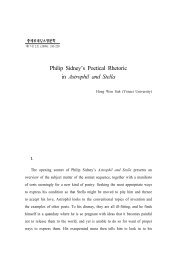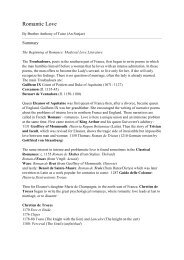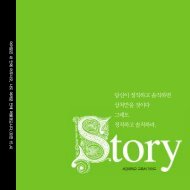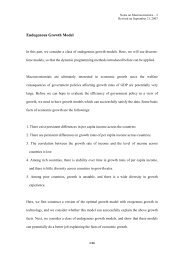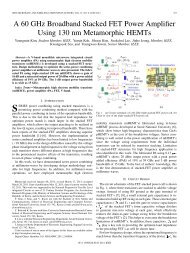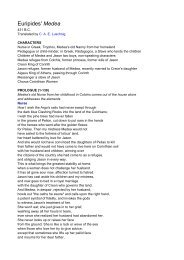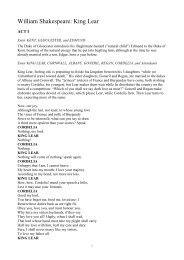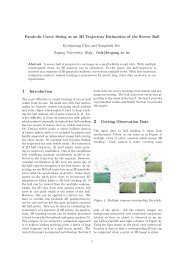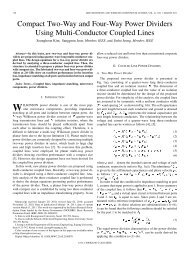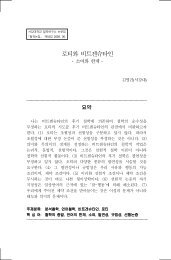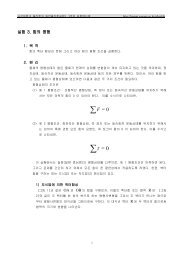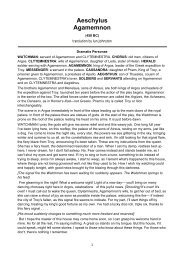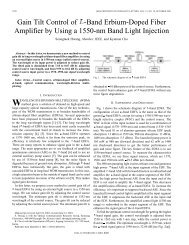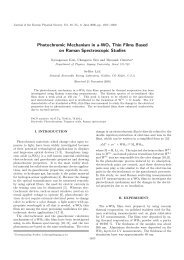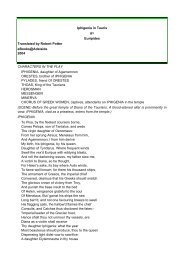THE KOREA REVIEW Volume 1, 1901 Homer B. Hulbert A.M. ...
THE KOREA REVIEW Volume 1, 1901 Homer B. Hulbert A.M. ...
THE KOREA REVIEW Volume 1, 1901 Homer B. Hulbert A.M. ...
You also want an ePaper? Increase the reach of your titles
YUMPU automatically turns print PDFs into web optimized ePapers that Google loves.
washing on her head. As she passed the old man said, “Can you tell me where I can find Paksuni’s<br />
wife? She’s my―ahem—niece.” The woman turned and stared.<br />
“I’m not your niece, what do you mean?” He stepped forward so that she could see him<br />
clearly.<br />
‘‘Don’t you know me? I’m Pak-suni.” The aged crone let fall the bundle of clothes and<br />
springing forward seized her long neglectful lord by the remnant of his once luxuriant top-knot and<br />
hauled him down the street demanding with each step why he had run away and left her to slave all<br />
these years.<br />
He enjoyed this. Here at least was one thing that, among all the changes, had not changed.<br />
He feared that he had been transported to some other world but this brought his feet down flat upon<br />
the earth. The neighbors lay awake that night listening with abated breath while she plied him<br />
alternately with her tongue and with a hong-duk-ka.<br />
From that time on let those who will, believe that life went smoothly for this Korean Rip<br />
Van Winkle.<br />
The First Bicycle<br />
Orientals are not so highly impressed by the products of western industry as we sometimes<br />
think they ought to be. If you say to the Korean, “Look at our submarine boat,” he yawns and answers<br />
“O yes, we had one here some three hundred years ago. It was an Ironclad in the shape of a tortoise<br />
and could go on the surface or below as well. We used it to drive back the Japanese reinforcements at<br />
the time of our little trouble with Hideyoshi.” You look blank and ask, “But why then did not you<br />
keep on and improve your boat and get all the good results [page 66] from your great invention?” He<br />
smiles and says, “You westerners look at these things differently from us. After the need for the craft<br />
had passed we simply threw it away. If occasion should again arise someone would make another,<br />
perhaps a better one. Now you westerners keep making these expensive things and using up your<br />
revenues in repairs and maintenance. That is like keeping a fan in your hand from the end of summer<br />
clear around to the beginning of next summer simply because you are going to need it then.” You try<br />
him again: “But just look at our wonderful bridges.” “O yes but they are only needed here in<br />
emergencies. Our ferrymen have to live you know. When we really need one we make it, as when the<br />
Chinese demanded that we bridge the Im-jin River some centuries ago to expedite the crossing of<br />
their army. At that time we built a suspension bridge a hundred and fifty yards lone in a few days but<br />
after it was done and we had reaped the benefit there was no use in paying out good money to keep<br />
the bridge up just for ordinary people. So we let it fall of its own weight.”<br />
You make one more effort, “But there is the bicycle.” He actually laughs at your impressive<br />
tone and answers, “Shall I tell you why we gave up bicycles? Well it happened this way. It was in the<br />
days of Mencius, if I am not mistaken, that a man in China invented the bicycle. It was made o£ wood<br />
and it had two different sets of mechanisms. One was to use when you went somewhere and the other<br />
was to use when you came back. One day the inventor took off the “coining- back” attachment and<br />
took it indoors to readjust it in some way. Unfortunately his mother passed a moment later and seeing<br />
the bicycle leaning against the house she thought it would be a fine chance for a spin; so she mounted<br />
and started off, and that was the last that was ever heard of hen Naturally the absence of the “comingback’’<br />
attachment made it impossible to come-back. Knowing what you do, of our feeling toward our<br />
parents it is not necessary to indicate why we have never since then made use of that interesting<br />
machine.” It is to be hoped that this startling tale will leave you strength enough to wonder what<br />
became of the old lady and whether she may not still be going like the Wandering Jew. From what we<br />
know of the roads in China she ought to have reached [page 67] Kashgar by this time, unless she has<br />
had a puncture meanwhile, (ungenerous thought!)<br />
We would put it out just as a suggestion to our globe-cycling mends that they keep their<br />
eyes open for her for there are without doubt papers in America that would gladly print the<br />
details―for instance whether she uses the free wheel or the bevel gear, and it may be that some of our<br />
ladies’ fashion papers would be glad to know whether she wears—but the subject of female apparel is<br />
quite too erudite for us.



